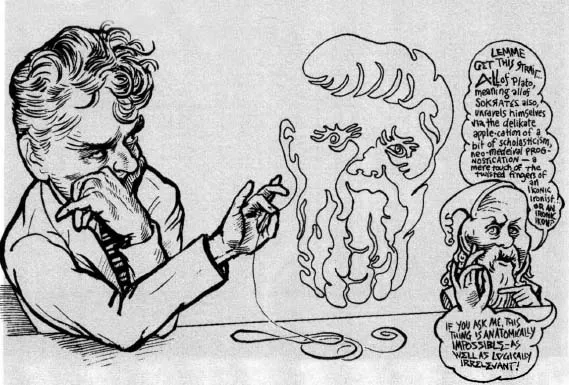
- 192 pages
- English
- ePUB (mobile friendly)
- Available on iOS & Android
eBook - ePub
Derrida For Beginners
About this book
In 1966, Jacques Derrida gave a lecture at Johns Hopkins University that cast the entire history of Western Philosophy into doubt. The following year, Derrida published three brilliant but mystifying books that convinced the pollsters that he was the most important philosopher of the late 20th Century. Unfortunately, nobody was sure whether the intellectual movement that he spawned – Deconstruction – advanced philosophy or murdered it.
The truth? – Derrida is one of those annoying geniuses you can take a class on, read half-a-dozen books by and still have no idea what he’s talking about. Derrida’s ‘writing’ – confusing doesn’t begin to describe it (it’s like he’s pulling the rug out from under the rug that he pulled out from under philosophy.) But beneath the confusion, like the heartbeat of a bird in your hand, you can feel Derrida’s electric genius. It draws you to it; you want to understand it... but it’s so confusing.
What you need, Ducky, is Derrida For Beginners by James Powell!
Jim Powell’s Derrida For Beginners is the clearest explanation of Derrida and deconstruction presently available in our solar system. Powell guides us through blindingly obscure texts like Of Grammatology (Derrida’s deconstruction of Saussure, Lévi Strauss, and Rousseau), “Différance” (his essay on language and life), Dissemination (his dismantling of Plato, his rap on Mallarmé), and Derrida’s other masterpieces (the mere titles can make strong men tremble in terror – Glas, Signéponge/Signsponge, The Post Card, and Specters of Marx.)
Readers will learn the coolest Derridian buzzwords (e.g., intertextuality, binary oppositions, hymen, sous rature, arche-writing, phallogocentrism), the high-and-low lights of deconstruction’s history (including the DeMan controvercy), and the various criticisms of Derrida and deconstruction, including Camille Paglia’s objection that America, the rock-n-roll nation, isn’t formal enough to need deconstruction.
The master, however, begs to disagree:
“America is Deconstruction” -Jacques Derrida
The truth? – Derrida is one of those annoying geniuses you can take a class on, read half-a-dozen books by and still have no idea what he’s talking about. Derrida’s ‘writing’ – confusing doesn’t begin to describe it (it’s like he’s pulling the rug out from under the rug that he pulled out from under philosophy.) But beneath the confusion, like the heartbeat of a bird in your hand, you can feel Derrida’s electric genius. It draws you to it; you want to understand it... but it’s so confusing.
What you need, Ducky, is Derrida For Beginners by James Powell!
Jim Powell’s Derrida For Beginners is the clearest explanation of Derrida and deconstruction presently available in our solar system. Powell guides us through blindingly obscure texts like Of Grammatology (Derrida’s deconstruction of Saussure, Lévi Strauss, and Rousseau), “Différance” (his essay on language and life), Dissemination (his dismantling of Plato, his rap on Mallarmé), and Derrida’s other masterpieces (the mere titles can make strong men tremble in terror – Glas, Signéponge/Signsponge, The Post Card, and Specters of Marx.)
Readers will learn the coolest Derridian buzzwords (e.g., intertextuality, binary oppositions, hymen, sous rature, arche-writing, phallogocentrism), the high-and-low lights of deconstruction’s history (including the DeMan controvercy), and the various criticisms of Derrida and deconstruction, including Camille Paglia’s objection that America, the rock-n-roll nation, isn’t formal enough to need deconstruction.
The master, however, begs to disagree:
“America is Deconstruction” -Jacques Derrida
Tools to learn more effectively

Saving Books

Keyword Search

Annotating Text

Listen to it instead
Information

Another of Derrida’s influential books in the United States is what most people would call a collection of three essays. It is entitled Dissemination. The first problem one notices, however, is that this book is a kind of non-book. Its preface refuses to be a preface. Its three essays refuse to be a collection or to present a thesis in the customary manner.
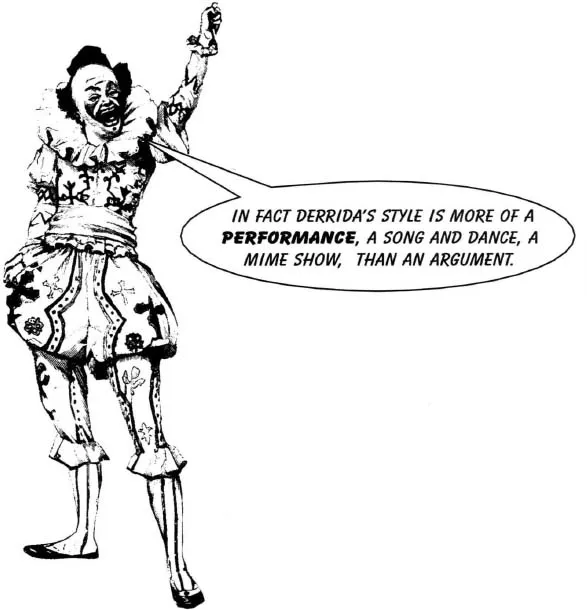
We must go against the spirit of this performance in trying to extract “its meaning.” At the time he wrote Dissemination, Derrida was associated with the ultra-left, avant-garde Parisian journal Tel Quel, a publication flirting with how a word, a poem, or language in general, can mean many things at once. Members of the Tel Quel group experimented with automatic writing, devoting themselves to an entire gang of surrealists, and to Mao and Mallarmé besides.
Each of the essays in Dissemination is divided into two parts, and each concerns itself with how the illusion of presence is presented or represented.
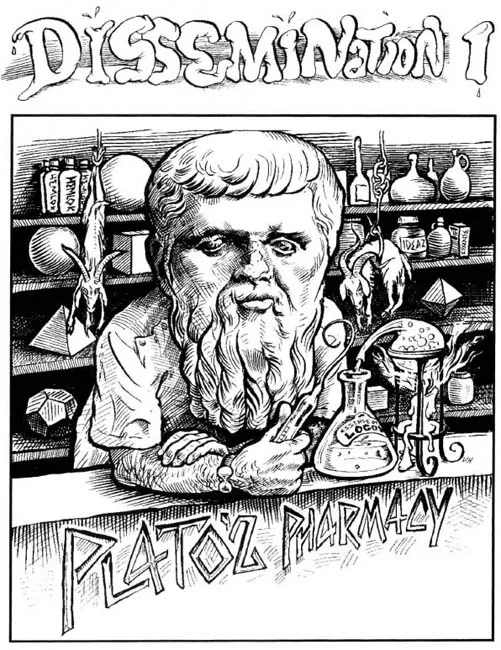

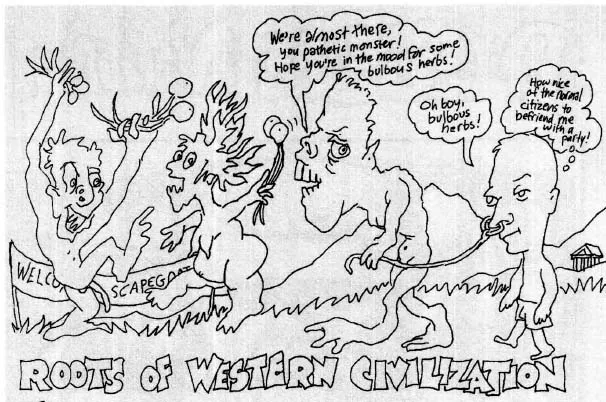

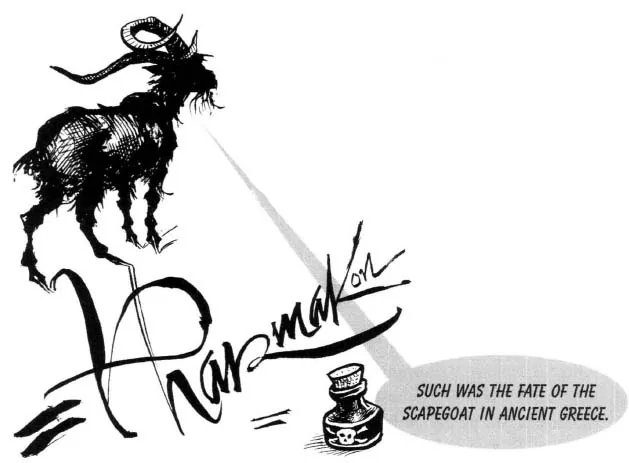
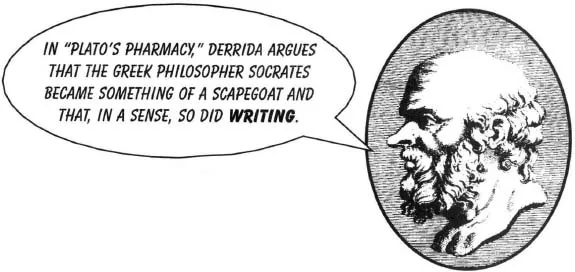
I have said that Derrida’s “essay” has no theme. But the theme of the essay would have been, if there would have been one, the play of textuality.


We recognize textuality when we realize that the word “pines” in the text:
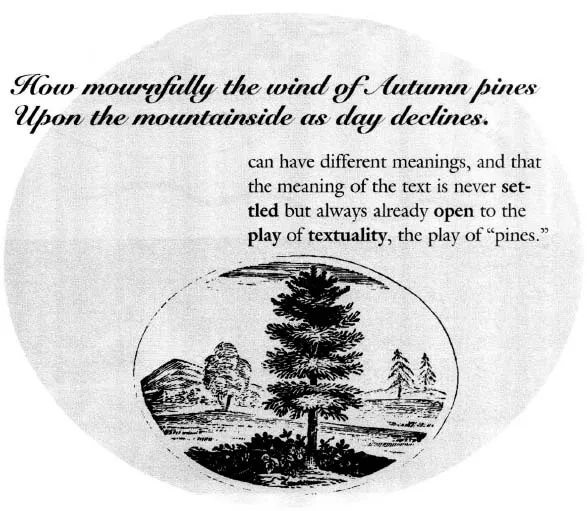
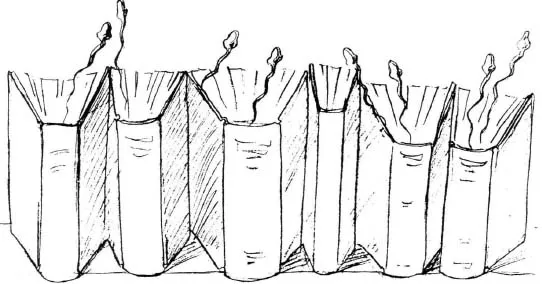
And textuality, the play of differences in writing, in and between books, poems, phrases, verses, ideograms, hieroglyphics, is an irresistible force. It cannot be repressed. This play is always already a fertile, potent ejaculation of meanings, a swarming of meanings, a dissemination or dispersal of meanings.
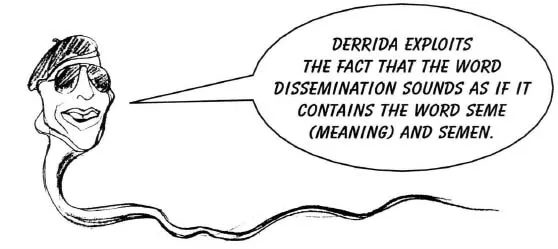
Yet, textuality is constantly called a villain, a fatal poison. Like the scapegoat who must be expelled from the very heart of the city, textuality, the play of meanings, must be violently ejected from nearness to the logos, the fixed, orthodox, rational, paternal, authoritative, spoken Word and the all-knowing Light of Truth of Which this Word is the living body.

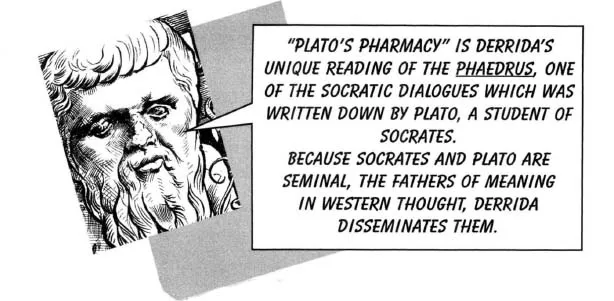

Pharmakon? What does that mean?

Well, it has many meanings, but for now, just know that it means poison, dru...
Table of contents
- Cover Page
- Copyright
- Dedication
- Contents
- Titlepage
- A Brief Biography
- Influences
- What is Poststructuralism ?
- What is Deconstruction?
- Of Grammatology
- Dissemination
- Freud and the Scene of Writing
- Différance
- Glas
- Signéponge/Signsponge
- The Truth in Painting
- The Post Card
- Specters of Marx
- Deconstruction in America
- Deconstruction and Buddhism
- Selected Bibliography
- Index
Frequently asked questions
Yes, you can cancel anytime from the Subscription tab in your account settings on the Perlego website. Your subscription will stay active until the end of your current billing period. Learn how to cancel your subscription
No, books cannot be downloaded as external files, such as PDFs, for use outside of Perlego. However, you can download books within the Perlego app for offline reading on mobile or tablet. Learn how to download books offline
Perlego offers two plans: Essential and Complete
- Essential is ideal for learners and professionals who enjoy exploring a wide range of subjects. Access the Essential Library with 800,000+ trusted titles and best-sellers across business, personal growth, and the humanities. Includes unlimited reading time and Standard Read Aloud voice.
- Complete: Perfect for advanced learners and researchers needing full, unrestricted access. Unlock 1.4M+ books across hundreds of subjects, including academic and specialized titles. The Complete Plan also includes advanced features like Premium Read Aloud and Research Assistant.
We are an online textbook subscription service, where you can get access to an entire online library for less than the price of a single book per month. With over 1 million books across 990+ topics, we’ve got you covered! Learn about our mission
Look out for the read-aloud symbol on your next book to see if you can listen to it. The read-aloud tool reads text aloud for you, highlighting the text as it is being read. You can pause it, speed it up and slow it down. Learn more about Read Aloud
Yes! You can use the Perlego app on both iOS and Android devices to read anytime, anywhere — even offline. Perfect for commutes or when you’re on the go.
Please note we cannot support devices running on iOS 13 and Android 7 or earlier. Learn more about using the app
Please note we cannot support devices running on iOS 13 and Android 7 or earlier. Learn more about using the app
Yes, you can access Derrida For Beginners by Jim Powell,Van Howell in PDF and/or ePUB format, as well as other popular books in Philosophy & Deconstruction in Philosophy. We have over one million books available in our catalogue for you to explore.


